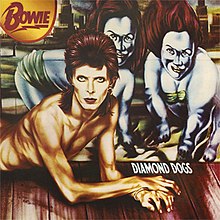Diamond Dogs
| Diamond Dogs | ||||
|---|---|---|---|---|
 |
||||
| Studio album by David Bowie | ||||
| Released | 24 May 1974 | |||
| Recorded | January–February 1974 | |||
| Studio | Olympic Studios and Island Studios, London; Ludolph Studios, Nederhorst den Berg, Netherlands | |||
| Genre | Glam rock | |||
| Length | 38:25 | |||
| Label | RCA | |||
| Producer | David Bowie | |||
| David Bowie chronology | ||||
|
||||
| Singles from Diamond Dogs | ||||
|
||||
| Professional ratings | |
|---|---|
| Review scores | |
| Source | Rating |
| AllMusic | |
| Blender | |
| Chicago Tribune | |
| Creem | C+ |
| Encyclopedia of Popular Music | |
| Pitchfork Media | 9.0/10 |
| Q | |
| Rolling Stone | |
| The Rolling Stone Album Guide | |
| Select | 5/5 |
Diamond Dogs is the eighth studio album by the English musician David Bowie, released on 24 May 1974 on the label RCA. Thematically, it was a marriage of the novel Nineteen Eighty-Four by George Orwell and Bowie's own glam-tinged vision of a post-apocalyptic world. Bowie had wanted to make a theatrical production of Orwell's book and began writing material after completing sessions for his 1973 album Pin Ups, but the author's estate denied the rights. The songs wound up on the second half of Diamond Dogs instead where, as the titles indicated, the Nineteen Eighty-Four theme was prominent.
Though the album was recorded and released after the 'retirement' of Ziggy Stardust in mid-1973, and featured its own lead character in Halloween Jack ("a real cool cat" who lives in the decaying "Hunger City"), Ziggy was seen to be still very much alive in Diamond Dogs, as evident from Bowie's haircut on the cover and the glam-trash style of the first single "Rebel Rebel". As was the case with some songs on Aladdin Sane, the influence of the Rolling Stones was also evident, particularly in the chugging title-track. Elsewhere, however, Bowie had moved on from his earlier work with the epic song suite, "Sweet Thing"/"Candidate"/"Sweet Thing (Reprise)", whilst "Rock 'n' Roll with Me" and the Shaft-inspired wah-wah guitar style of "1984" provided a foretaste of Bowie's next, 'plastic soul', phase. The original vinyl album ended with a juddering refrain Bruh/bruh/bruh/bruh/bruh, the first syllable of "(Big) Brother", repeats incessantly. "Sweet Thing" was Bowie's first try at William S. Burroughs' cut-up style of writing, which Bowie would continue to use for the next 25 years.
...
Wikipedia
